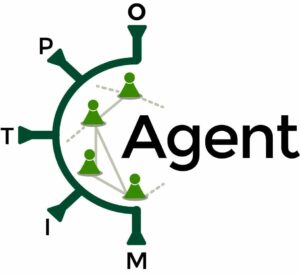
Optimal control of the epidemic under heterogeneity conditions - decision making perspective on agent based modelling
Project objectives
The SARS-CoV-2 pandemic poses an unprecedented challenge to society and policy-making. The goal of OptimAgent is to develop a standardized model-based framework to support public health decision-making processes. This framework will enable the evaluation of a wide range of infection control interventions. The focus is on the design of an agent-based model that goes significantly beyond the simulation approaches available to date.
Through a flexible modular structure and an extensive consultation process with national and international modeling experts, the model will be optimized to inform health policy decision-making during future pandemics. Furthermore, it will be adaptable to endemic pathogens and will realistically reflect the socio-demographic and regional structures of Germany. The agents underlying the model combine demographic, socioeconomic, sociological, and psychological characteristics that influence individual contact behavior, risk of infection, and risk of disease.
Based on the results of comprehensive and sophisticated analyses of contact behavior, specific model modules on selective, targeted contact restraints in different settings, contact tracking and testing strategies are developed. The flexible modular design of the model also offers possibilities for easy integration of additional components.
The main focus of the project is to analyze the impact of different aspects of heterogeneity in the population structure and their interaction on the incidence of infection. This will provide new insights regarding the role of heterogeneity in the spread of severe respiratory infectious diseases in the population and the effectiveness of pandemic control measures.
Project structure
OptimAgent is divided into the phases “Conceptualization”, “Development & Analysis” and “Application” and consists of six interlinked subprojects.
Subproject 1 -
Heterogeneity in contact behavior and in the uptake of preventive measures in different phases of an epidemic
Explores heterogeneity in contact behaviors and compliance with nonpharmaceutical interventions and their impact on transmission patterns across populations.
Subproject 2 -
Heterogeneity of socio-psychological determinants of health behaviors
Focuses on psychosocial aspects that influence health behaviors and creates a module to generate artificial populations.
Subproject 3 -
Estimation of spatial and temporal heterogeneity - Methods for parameterization and learning of models
Develops a principled approach to deriving time- and spatially-resolved epidemiological parameters from multiple data sources.
Subproject 4 -
Development of representative scenario populations for epidemiological models
Develops a tool to generate representative scenario populations for epidemiological models.
Subproject 5 -
Development of the German Epidemic Micro-Simulation System
Will develop an agent-based reference model for Germany that integrates work from subprojects 1-4 and 6 and enables simulation of complex scenarios.
Subproject 6 -
Effects of synergistic interactions between exposure and susceptibility to infectious diseases on socioeconomic inequalities in disease burden and the effects of infection control measures
Creates a decision analytic module that estimates effectiveness and efficiency of alternative non-pharmaceutical interventions.
Project managers
Subproject 1
Dr. André Karch, WWU
(Subproject leader)
Veronika Jäger, WWU
Dr. Rafael Mikolajczyk, MLU
Dr. Vitaly Belik, FUB
Subproject 2
Dr. André Calero Valdez, UzL
(Subproject leader)
Subproject 3
Dr. Markus Scholz, UnL
(Subproject leader)
Subproject 4
Dr. Jan Pablo Burgard, UnT
(Subproject leader)
Dr. Ralf Münnich, UnT
Subproject 5
Wolfgang Bock, TUK
(Subproject leader)
Dr. Bernd Hellingrath, ERCIS
Johannes Horn, MLU
Dr. Mirjam E. Kretzschmar, UMC
Dr. Tyll Krüger, WUST
Subproject 6
Jun.-Prof. Dr. Alexander Kuhlmann, MLU
(Subproject leader)
Berit Lange, HZI
Dr. Wolfgang Greiner, UnB
Dr. Beate Jahn, UMIT
Dr. Uwe Siebert, UMIT
Project partners
Prof. Dr. Rafael Mikolajczyk
Dr. Johannes Horn
Dr. Daniel Rodenburger
Moritz Kersting
Carla Hartmann
Institute for Medical Epidemiology, Biometry and Informatics, Martin-Luther-University Halle-Wittenberg
Jun.-Prof. Dr. Alexander Kuhlmann
Research Group Health Economics and Health Services Research, Martin-Luther-University Halle-Wittenberg
Prof. Dr. André Karch
Dr. Veronika Jäger
Phuong Huynh
Institute for Epidemiology and Social Medicine,
Westfälische Wilhelms-Universität Münster
Prof. Dr. Bernd Hellingrath
Johannes Ponge
Institute for Business Information Technology,
Westfälische Wilhelms-Universität Münster
Prof. Dr. Vitaly Belik
Andrzej Krzysztof Jarynowski
Institute for Veterinary-Epidemiology und Biometry, Freie Universität Berlin
Prof. Dr. Markus Scholz
Institute for Medical Informatics, Statistics and Epidemiology, Universität Leipzig
Prof. Dr. André Calero Valdez
Lilian Kojan
Institute for Multimedia and Interactive Systems,
Universität zu Lübeck
Prof. Dr. Jan Pablo Burgard
Prof. Dr. Ralf Münnich
Soheil Shams
Chair of Economic and Social Statistics,
Universität Trier
Dr. Wolfgang Bock
Lukas Bayer
Department of Technomathematics,
Technical University of Kaiserslautern
Dr. Berit Lange
Dr. Isti Rodiah
Department for Epidemiology, Helmholtz Center for Infection Research GmbH
Prof. Dr. Wolfgang Greiner
Maren Steinmann
Sebastian Gruhn
Fakulty for Health Services,Universität Bielefeld
Prof. Dr. Tyll Krüger
Technical University Breslau
Prof. Dr. Mirjam E. Kretzschmar
Universität Utrecht
Prof. Dr. Beate Jahn
Prof. Dr. Uwe Siebert
UMIT – Private University of Health Sciences, Medical Informatics and Technology GmbH (UMIT TIROL)
Richard Pastor
Steven Schulz
NET CHECK
Scientific Advisory Board
Vittoria Colizza
Research Director at the Pierre Louis Institute of Epidemiology
Luca Ferretti
Senior Researcher at the Big Data Institute, Oxford University
Simon Cauchemez
Head of the Department of Mathematical Modeling of Infectious Diseases at the Pasteur Institut
Stefan Flasche
Co-Director of the Centre for Mathematical Modelling of Infectious Diseases (CMMID).
London School of Hygiene and Tropical Medicine
Franciszek Rakowski
Head of the Polish modeling team, ICM University of Warsaw
Nicolas Popper
Chairman of DEXHELPP (Decision Support for Health Policy and Planning)
Coordinator of COCOS (Center for Computational Complex Systems), Vienna University of Technology
